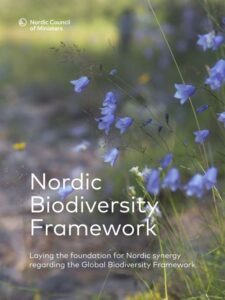The report Nordic Biodiversity Framework – Laying the foundation for Nordic synergy regarding the Global Biodiversity Framework was published by the Nordic Council of Ministers on 3 June 2025.
The project Nordic Biodiversity Framework (NBF) examined the implementation of the Kunming-Montreal Global Biodiversity Framework (GBF) in policy in the Nordic region. The NBF is a collaborative environmental policy project involving Iceland, Denmark, and Finland. It was established in 2024, and aimed to enhance synergy in achieving the GBF targets across Nordic countries. This project was funded by the Nordic working group for Biodiversity of the Nordic Council of Ministers in 2024.

Supplementary material
- Workshop in Iceland, April 2024
- Workshop in Finland, October 2024
- Workshop in Denmark, December 2024
- Policy and GBF implementation overview
- Activities and publications in 2024-2025
Summary of the Nordic Biodiversity Framework
Rapid biodiversity loss is one of the most pressing issues of our time. In response, 196 countries, with the Nordic countries among them, signed the Kunming-Montreal Global Biodiversity Framework (GBF) in 2022. Now the task is to move from agreement to implementation and policy. This challenge requires careful science-based policy grounded in knowledge of local and regional ecosystems and biodiversity challenges, as well as transnational and transdisciplinary collaboration. The Nordic Biodiversity Framework (NBF), a collaborative project between Iceland, Finland, and Denmark, was developed in 2024 to support such synergy.
The cultural, political, and historical similarities between the Nordic countries provide good potential for Nordic cooperation on the protection of nature and biodiversity. However, there are lessons to be learned through comparison. Iceland, Finland, and Denmark have relevant differences in climate, nature, political culture, and infrastructures for biodiversity protection. Both the similarities and differences provide the diversity to create synergy that enables us to learn from each other and identify important issues and leading practices. The NBF aimed to lay the groundwork for this by compiling existing knowledge about biodiversity issues and examining the status of GBF implementation of targets 1-8 in each of the member countries (Iceland, Finland, and Denmark). In order to accomplish this, three workshops were conducted in 2024, one in each member country along with several supportive side activities.
Some of the main differences between NBF member countries are political, primarily in EU membership, which affects policy making, implementation, and governance of biodiversity actions. The threats to biodiversity differ greatly between the three countries but a common thread is competition between biodiversity and business (or defence) interests. Other common themes and messages emerged, such as: the need for a better understanding and larger role of the Ecosystem Approach, conflicting interpretations or misunderstanding of key concepts (e.g., biodiversity, protected areas), a lack of effective or relevant policies for biodiversity conservation, and a lack of support and resources. The primary obstacle to achieving the national GBF targets (NBSAPs) is threefold: Finland’s NBSAP has not been approved by the government, Denmark’s NBSAP was disputed by the Danish Biodiversity Council and Iceland failed to submit an updated NBSAP to the Convention of Biological Diversity Secretariat for COP16 in 2024. Regardless of these barriers, there are various efforts ongoing to implement the GBF goals and targets in these countries and there is clearly a general increase of awareness of biodiversity within both the public and political spheres.
Issues and publications indirectly related to the Nordic Biodiversity Framework
- Ecosystem approach report 2023
- Essay on Ecosystem approach by Ole Martin Sandberg
- EU Biodiversity Strategy report by Hanna-Kaisa Lakka et. al 2023
- Project with the ministry of industries in Iceland
- The GBF Monitoring Framework
More information on the Nordic Biodiversity Framework / Líffræðileg fjölbreytni Norðurlanda: Background, aims and team members.